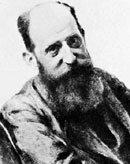Sigmund Freud And... |
Joseph Breuer Born in Vienna, from a family involved in Judaic religious instruction, Breuer became quickly devoted to his medical
studies. In 1867 he was awarded the Privat-Dozent title, but gave up a university career to dedicate himself to his private customers. Simultaneously with his clinical practice, Breuer carried out research tasks at the
Institute of Physiology, directed by Ernst von Brüke. It is in this context that, in 1880, he met Freud, his fourteen years junior. The relationship between Freud and Breuer was rather
characteristic of the links that Freud would establish during those years and even later, with their mixture of dependence, admiration and competition. Breuer played a paternal role for
Freud, even financially supporting his younger colleague in the years when he established his family life. The account of Anna O. case, treated by Breuer, was to be the source of
work leading to publications such as the famous Studies on Hysteria, in 1895. With the publication of this book, marking the theoretical disagreements between the two men, the relationship between
Breuer and Freud was already broken. Several years later, after the Breuer's death, Freud was deeply moved to learn, from a close relationship of theirs, that Breuer had very
sympathetically followed the evolution of his life and career.
--
Copyright René DesGroseillers
Read also:
|
|
Home | Resources | Forum | Newsletter | Contact Copyright 1999-2024, AROPA. All rights reserved.
![]()